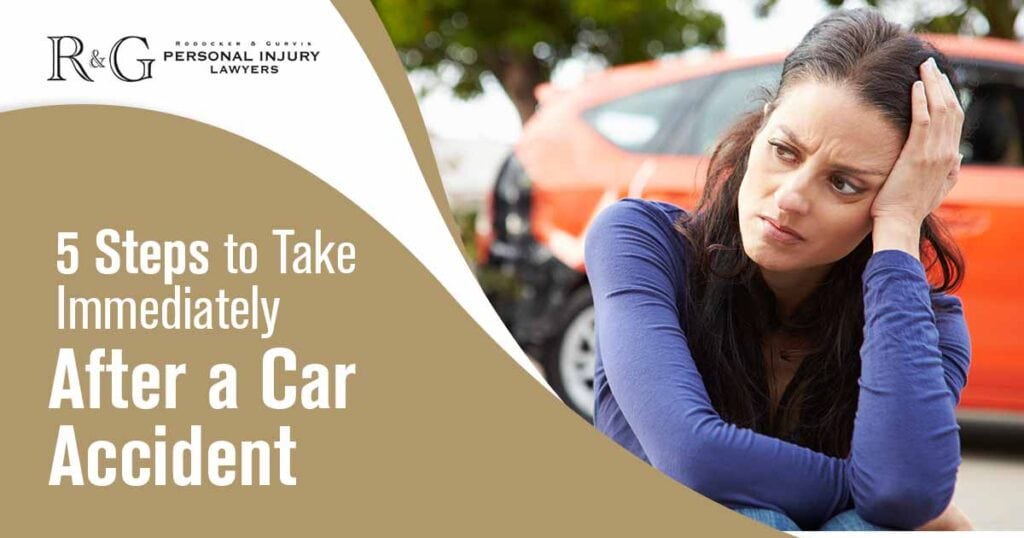If you’ve experienced a car accident, you might feel overwhelmed and frightened, and it can be hard to immediately think about what you should do at the scene. Do your best to stay calm and consider emergency medical attention first. If emergency medical care isn’t needed, there are some specific steps to take to ensure your safety and protect your legal rights after a car accident.
Stay Calm and Assess the Situation
After a car accident, you might feel many emotions, and that’s okay. Feeling shock, fear, guilt, nervousness, or anger is normal; however, staying calm is essential. Calming techniques like taking a few deep breaths or counting to 10 can be helpful. Car accidents can be stressful, but maintaining a relaxed, usual demeanor can help you stay in control. The calmer you are, the better you will be able to handle the situation and take the appropriate steps after a car crash.
Your safety and wellbeing should be your priority. Make sure you don’t have any serious injuries and any passengers you have are safe and uninjured. If another vehicle is involved in the accident and you are safe and unharmed, check that the other vehicle’s driver and any passengers are okay, too. Be cautious when checking for injuries since all injuries aren’t visible. If you or anyone involved feels dizzy or out of it, call 911 or any other number your state uses for emergency roadside assistance. Obtaining prompt medical attention when necessary ensures your wellbeing and establishes a record of injuries for insurance purposes.
Once you’ve assessed the situation and checked for injuries, if it is safe to move your vehicle, move it to a safer location nearby and out of the way.
Exchange Information with Other Drivers
It’s important to talk to other drivers involved in the crash to collect information necessary for the police report, your records, and your insurance claim. Keep conversation limited to just the essential information. Avoid small talk or discussing details of the accident. It would help if you didn’t share opinions about the accident, what caused it, or whose fault it might be. The less you say after a car accident, the better.
Make sure you get the following information from the other drivers:
- Nombre
- Phone number
- Address
- Driver’s license number
- License plate number
- Insurance information
If there were any witnesses to the car accident, you must get their contact information. Your attorney, the police, or the insurance company can contact them later to get their account of what happened.
To ensure information is written down correctly and correctly, use your phone to take a picture of the other driver’s license and insurance card, which you can later email or text to yourself or others, like your attorney.
Document the Scene
It would help if you documented everything at the accident scene. If you’re unsure if something could be helpful, report it anyway because all evidence matters for your case. Suppose you cannot collect all possible evidence yourself. In that case, having someone else collect pictures, videos, witness statements, and other potential evidence is okay to ensure your claim has proper evidence.
It would help if you only discuss your car accident with a lawyer. Avoid talking about the accident with others involved and only talk about the necessary information you need. You want to say as little as possible about your actions, and it’s best to speak with a law enforcement officer first to file a police report.
Look around the accident scene and gather information about what happened before and after the auto accident. You’ll want to take notes on the following types of information while the details of the car accident are still fresh in your mind:
- The date and time of the accident
- Where the accident occurred
- The road you were on
- The nearest cross-street
- Which direction you and the other car were traveling
- The driving conditions
- Your recollection of what happened
Taking these notes as soon as possible is essential since you’ll likely forget specific details in the days after the car accident. If you aren’t able to take notes at the accident scene, do it as soon as possible after the accident.
Pictures of the accident scene can be as crucial for your case as notes. Try to take photos from as many angles as possible, or have someone else do it if you can’t. Photo evidence can be crucial to your case, and your insurance company and your attorney will want photo evidence.
If possible, take pictures of the following:
- Any injuries
- How and where the cars are located
- Where on the street the accident occurred
- Signs of the closest crossroads
- Road conditions
- Property damage
- Vehicle damage
Notify Authorities and Report the Accident
In some states, you must legally report the car accident to law enforcement officials. Call 911 or another emergency services number and let the police know you were involved in a car crash. A police officer will speak to everyone involved and prepare an accident report, which helps an attorney evaluate your legal case. This report details what happened, documents all parties, and provides information a personal injury lawyer will need.
A law enforcement officer’s official police report can be beneficial if you seek compensation and must deal with insurance companies. The officer’s presence can also be helpful if the other driver was driving under the influence or without car insurance.
When speaking with the police officer, ask for the officer’s name, badge number, and report number. Some officers may have a business card with their information and may write the report number on it. Make sure you keep the officer’s information and the report number in a safe place. You’ll need this information to get a copy of the report when it’s ready.
Seek Medical Attention
After a car accident, it’s essential you get medical attention as soon as possible if you just don’t feel right or have even the slightest indication of an injury. Your health and well-being should be your priority, but getting the appropriate medical care—and having medical records and bills that document that medical care—after an accident will strengthen any car accident injury claim you make.
Post-Car Accident Checklist
Being in a car accident can be a scary experience, and knowing what to do in case you are ever involved in one can help you stay calm. This is important so you can properly assess the information and take the necessary steps after a car accident.
- Stay calm and assess the situation, including if anyone is injured.
- Exchange necessary information with the other drivers.
- Document the scene of the car accident.
- Notify law enforcement officials and report the car accident.
- Seek emergency medical care.
R&G Car Accident Attorneys Can Help You With Your Personal Injury Claim
A abogado de lesiones personales can help you navigate an insurance claim and help you through all the other effects an accident might have. A personal injury lawyer who knows your state’s laws can fight against the insurance companies and their unlimited resources and lawyers.
The best car crash lawyers start by evaluating your accident and gathering all necessary evidence. Personal injury lawyers can also help connect you to car accident experts, doctors, and other professionals who can support your case. They will negotiate with insurance companies to increase your claim or push you to go to trial if you aren’t receiving the correct compensation.
Call R&G Personal Injury Attorneys today to discuss your car accident. For a consulta gratuita, call us in Columbus, Ohio, at 614-221-3750 or in Cary, North Carolina, at 919-561-6800.





